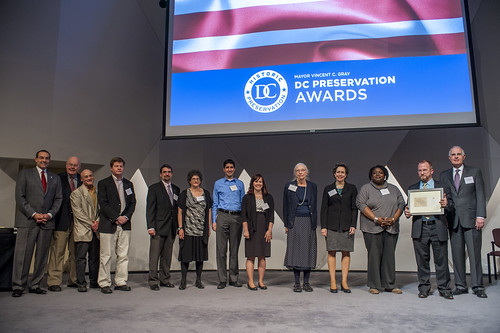On Monday, the Annual Conference on DC Historical Studies was honored with a DC Historical Preservation Award. Mayor Gray and the DC Office of Planning's Historic Preservation Office honored this volunteer-led professional conference, of which I am happily a part, on its 40th anniversary! Our conference committee includes: Matthew Gilmore, chair (holding the award in the photo below); Brett Abrams, Johanna Bockman, Jeffrey Donahoe, Mark Greek, Stephen
Hansen, Ida Jones, Chris Klemek, Jennifer Krafchik, Jane Freundel, Levey, Adam
Lewis, Jenny Masur, John Muller, John Richardson, Gary Scott, Kimberly
Springle, Mary Ternes, Ruth Trocolli, and Kim Zablud. The other awardees are listed here.
Here is the conference committee looking fabulous:

This year's conference will take part on November 14-17, 2013 here in DC. The theme for the 40th Annual Conference is “Marching on Washington,” covering a diverse range of anniversaries: the 1963 Civil Rights March on Washington, the 1973 initiation of modern Home Rule, the centennial of the 1913 Woman Suffrage Procession, and the sesquicentennial of the Emancipation Proclamation. The panels will also cover a wide range of other DC Studies topics. Our keynote speaker will be Professor Kate Masur from Northwestern University's history department. She has written a great book on DC (that I reviewed) and numerous wonderfully controversial op-eds.
I really wanted to attend the awards ceremony, but that evening I had already planned a "Gentrification Observation" with the Cities & Globalization Working Group at Foggy Bottom. This observation involved not only seeing the gentrifying sites, but also visiting Lindy's Red Lion (a bar on the working-class-DC circuit and the student circuit) and District Commons. One member of the group suggested that our group should not longer provide business to gentrifying restaurants, even if the purpose is only to study them. An interesting point.
Here is the conference committee looking fabulous:

This year's conference will take part on November 14-17, 2013 here in DC. The theme for the 40th Annual Conference is “Marching on Washington,” covering a diverse range of anniversaries: the 1963 Civil Rights March on Washington, the 1973 initiation of modern Home Rule, the centennial of the 1913 Woman Suffrage Procession, and the sesquicentennial of the Emancipation Proclamation. The panels will also cover a wide range of other DC Studies topics. Our keynote speaker will be Professor Kate Masur from Northwestern University's history department. She has written a great book on DC (that I reviewed) and numerous wonderfully controversial op-eds.
I really wanted to attend the awards ceremony, but that evening I had already planned a "Gentrification Observation" with the Cities & Globalization Working Group at Foggy Bottom. This observation involved not only seeing the gentrifying sites, but also visiting Lindy's Red Lion (a bar on the working-class-DC circuit and the student circuit) and District Commons. One member of the group suggested that our group should not longer provide business to gentrifying restaurants, even if the purpose is only to study them. An interesting point.
P.S. And here are the sponsors of these awards. Developers, bankers, and so on. What does this mean about the historic preservation awards? Might buildings be given higher priority than the people in and around those buildings?
Landmark Partner

Capstone Partners


Keystone Partners
Cornerstone Partners
Carr Properties
Hartman-Cox Architects
Quinn Evans Architects
Foundation Partners
The Christman Company
Holland & Knight LLP
Martin Ditto
Forest City Washington
SK&A Group
Wagner Roofing
Zuckerman Gravely
Regarding the gentrification observation, that **is** the tricky part; people who critique the process sometimes also like to go to the trendy restaurants and other businesses that are a part of gentrification processes. I think it **is** a contradiction (if not downright hypocritical), and yet it also points to the complexity of the topic of gentrification itself, or is that just an easy way out for wine-sipping academics?
ReplyDeleteWhat to do about places like the old Hawk and Dove that was a trendy, gentrifying restaurant when it opened during the hyper end of the 1960's? (It made excellent French Dip and Croque Monsieur sandwiches.) By the 2000's it had acquired patina and people were celebrating its status as an authentic hangout of the working-class circuit of the "old" neighborhood. Thirty years from now we could well be celebrating some of the same places shunned by today's critics of gentrification.
ReplyDeleteThere is a more interesting side to the award to the Conference on DC Historical Studies, though. I have read that the announcement by Mayor Gray acknowledged the growing availability of historical records in new forms of media, i.e., digitized records, as a boon to research in DC history. Ironically, his administration (Registrar for Vital Records) has just forced Familysearch.org to block access to digitized DC historical records at that site for researchers who are not members of the LDS Church. Meanwhile, the alternatives--the old paper records--are not easily or freely accessible or searchable, even at DC Archives, because of condition and staffing constraints.
Sandy